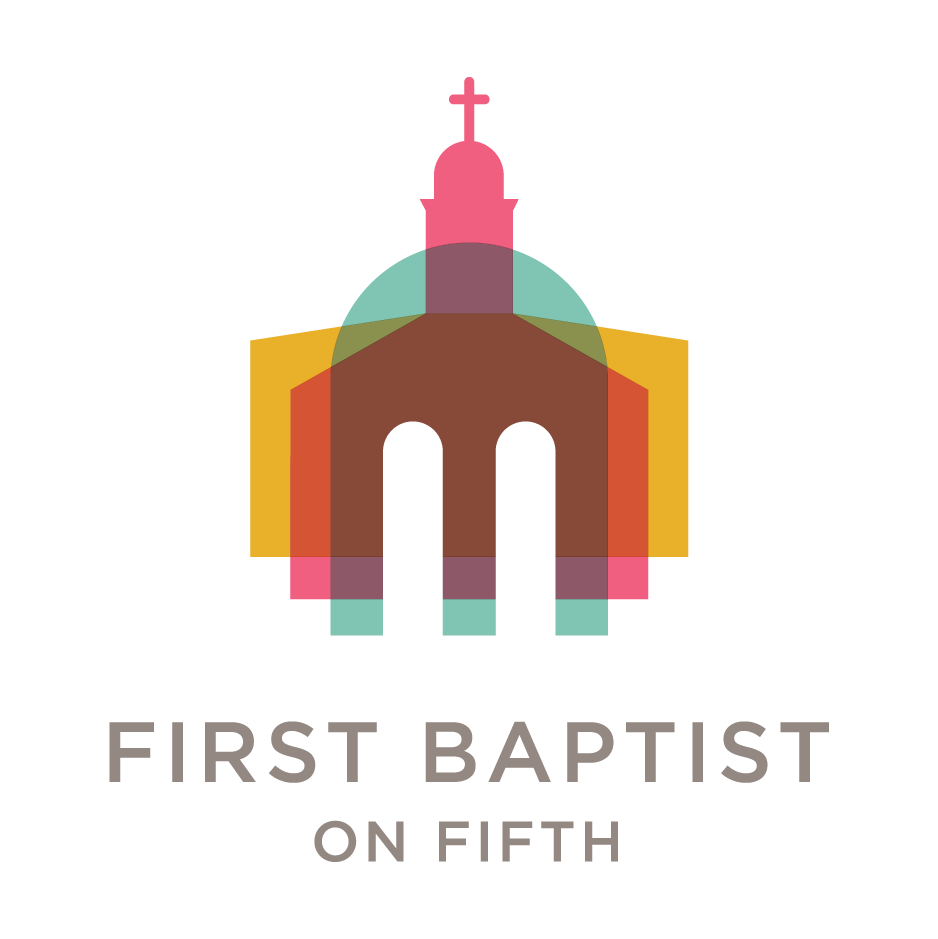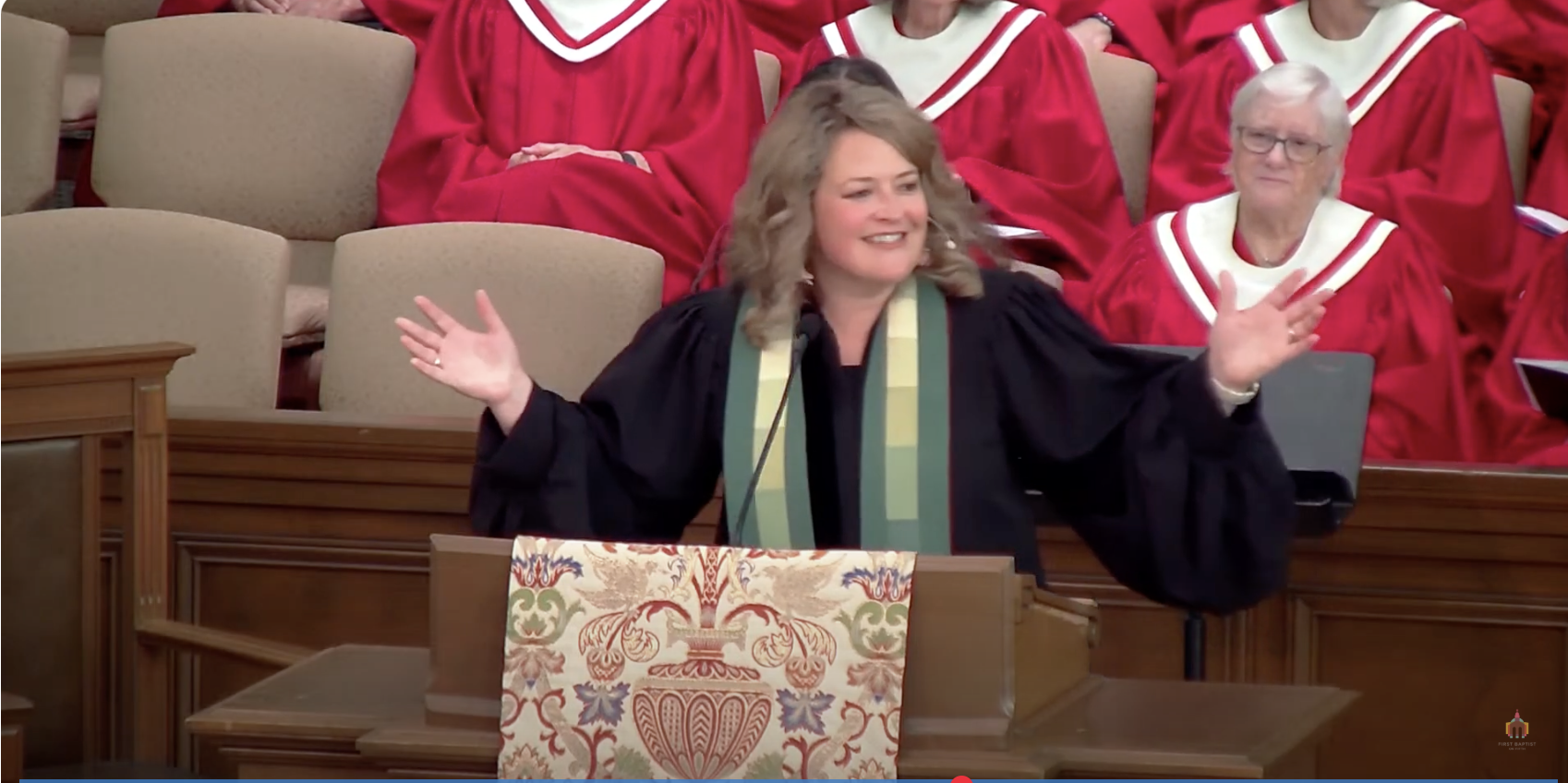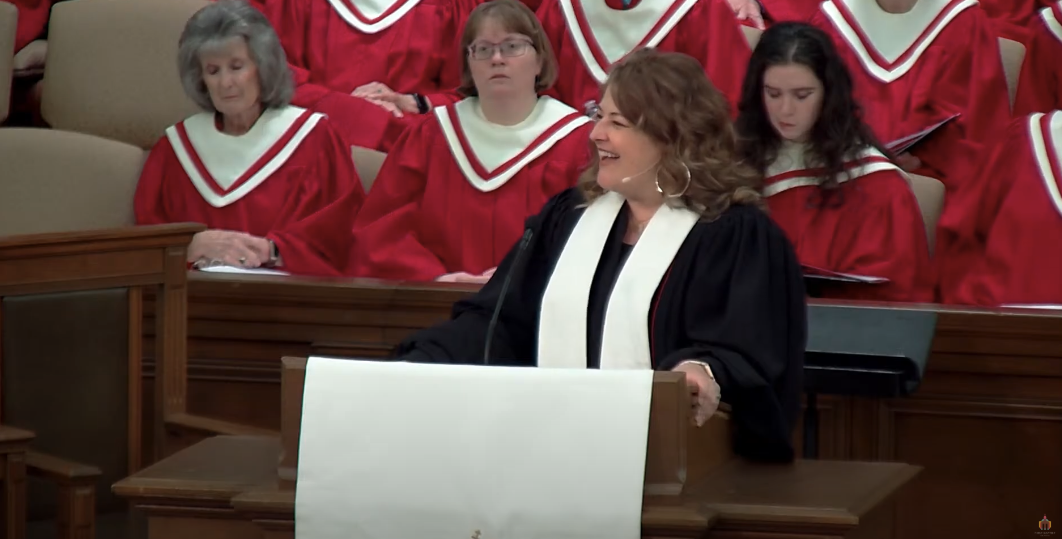II bet you know that story about the little girl, who could be one of yours or one of ours, who drew a picture in Sunday School one week. Scattered about her table were all her creative tools — crayons, markers, colored pencils, stickers — and her face was scrunched up with intense focus on her work. So concentrated was her creativity, she barely noticed the interruption when her teacher asked her what she was drawing. “I am drawing a picture of God,” she said. Her teacher replied, “But, my dear, nobody knows what God looks like!” Confident and clear, the little girl replied without looking up or skipping a beat, “Well they will when I’m finished!”1
Would that we all have such confidence, right?
II Last Sunday, we marked Trinity Sunday with a deep dive into the nature of God – how God is three and one, the way God is inseparable from relationships and connection, and what that might mean for us. In some ways, we pick that thread up right where we left off, as we begin a summer-long dive into Genesis, our faith’s origin story of all that is. Each week, we’ll look carefully at a particular character or characters in the story to see a glimpse of ourselves, and today we start with the One who is the beginning of every story: God. (Now I can’t promise that by the end of the sermon you’ll be able to know exactly what God looks like, but let’s give it a go, shall we?)
For millions around the world, this story of creation is as familiar as any other story we know. “In the beginning,” or in a more accurate translation of the Hebrew, “when God began to create,” the world emerged with words. God’s words, calling all things now living into being. God’s creation is purposeful, threaded with the uncoerced freedom given to all creation. God and creation are bound together, a relationship of mutuality and care. As Walter Brueggemann has said, “God authors life, but there is no hint of authoritarianism.”2
The story of creation might leave us with a million questions. But how did it happen? What about the Big Bang, the dinosaurs, evolution, the timing of it all? Did all that creating happen literally in six days? On and on we go, until we just thank the good Lord that a day off was in there somewhere! Yet amidst all we may not know, all the questions that creation raises, all the wonder and mystery that we shouldn’t try to solve, I want us to remember what we do know – about God and about us – from this story, so that if we ever attempted to draw what God looks like, we could start where it all began with this first and most important truth: God is good. And I am good too. III.
How do we know this? Let me explain.
This week, my kids finished their school year with a flourish. With 4th grade, 2nd grade, and kindergarten now in the rearview mirror, we took some time this week to mark this ending: naming highs and lows from the year, considering learnings and challenges, and laughing a whole lot about their hijinks along the way. But no ending is complete without looking back to the beginning, to the starting point that orients us toward what will be. So of course I had to go back and look at their “first day of school” picture from August now laid beside the “last day of school” picture to notice growth, expansion, wonder.
This rhythm of endings and beginnings calls my attention to the ‘starting points’ of our lives – the emotional place from which we begin, sometimes over and over throughout the living of our days. Starting points have a certain freshness to them, don’t they? The slate is blank, the board is clean. It is from here that we, well, live.
Yet to use our most obvious starting point of a new day as an example here, so often we start each day from a hungover place: meaning, yesterday’s troubles hang over into today’s beginning. We are awakened: some by light, some by an alarm, with nature calling or dogs barking or babies crying. And before we can even “jump out of bed and stumble to the kitchen, and pour ourselves a cup of ambition” (thanks, Dolly Parton!), our orientation to the new day presses from yesterday and yesteryears into our mind and heart and body and spirit. It runs like a tape in our heads, rewound and repeating from the day before. I’m exhausted. I’m already behind. I have so much to do. I’m in pain. Will things everslow down? I just don’t have the energy to change. I really screwed up. I’m so terrified. I’m so angry. My best moments are behind me. It’sjust too hard. I can’t keep doing this. They’ll never come back. I am the worst. I’m not worthy of love.
Those tapes? We know their origin story. The middle school bully. The parent with whom you never felt you could measure up. The fractured relationship whose harms you fear are irreparable. The micromanaging boss who never acknowledged your hard work. The insatiable drive and hunger for stretching beyond what is expected of you. The relentless pace and all-consuming media of our modern world. The accident, the surgery, the illness, the event that changed your body’s functioning forever. The loss that utterly reoriented your life. These tapes have played in our hearts for so long, they’ve become habitual. Woven into the fabric of our lives. Unimaginable to let go. The default settings through which we move throughout the world.
Yet when we start here, we stay here. So what if instead you started with the truth of creation: God is good, and I am good too. God is good, and I am good too. Instead of starting with pain or exhaustion or a to do list or fear or loss, whatif you started with goodness?
Here’s what I mean.
In the beginning was God, speaking creation into being from the very center of it all. Separating, ordering, making sense of things, casting goodness in every square inch of this universe we call home. “Let there be light,” God said, summoning the luminous. “Let there be seas and dry land,” beckoning wave and sand and the holy middle in between. “Let there be sun and moon and stars and plants and creatures and humankind in all their variety.” God didn’t have to create! God didn’t have to command the grand and the tiny into themselves! What could have compelled God to do such remarkable work?In his poem, “God’s Trombones,” the great Black poet James Weldon Johnson wonders aloud: “And God stepped out on space, and he looked around and said: I’m lonely – I’ll make me a world.”3 From nothing, everything. From one, all. From isolation, connection.
Early Jewish rabbis loved to speculate about creation, and wondered among themselves if God knew the risks involved in creating the world. Creation, they said, was really God choosing to give up God’s perfect oneness. It was God choosing to literally spread the love around. To make new things, a universe filled with creatures of all shapes and sizes, even humans, which were made in the divine image, with the freedom to do something other than the will of God. The freedom to hurt each other, to kill, to destroy the very creation of which they’re a part. Even the freedom to forget where or whom they came from.
Did God think about these things? Surely, they determined, God must have. So why would God do this? Why make creation? Wouldn’t it have been better and cleaner and certainly less messy or maddening for God to just be perfect and complete as God without all the rest? Well the answer they came to is that for God, the risk of creation was worth one righteous person—one tzadik, in Hebrew. That if God could share in the goodness and blessing of creation with just one other—then all the risks of opening up, the risks of bringing others to the table of existence would be worth it. That God must have decided the possibility of relationship, the chance at community, was worth all the rest of it. That even in all the disasters and the catastrophes, even in the pain and the fear, even in the certain loss and profound destruction, even in death, God determined the hope of something new – new relationships, new community, new things among us – was worth the risk.4“Love still takes the risk of birth,” as Madeleine L’Engle reminds us.5
A common refrain in some of our sister churches is this: “God is good, all the time. All the time, God is good.” But now listen, you have to say it with me, you gotta tap into your inner Pentecostal and holler a bit in church! I say, “God is good.” You say, “all the time.” I say, “all the time.” You say, “God is good.”
God is good, all the time; all the time, God is good. This refrain becomes the starting point for worship, never suggesting that this is the only story, or that there is no room for pain or loss or endings that we all experience. Starting with goodness doesn’t mean that God can’t handle your anger or your doubt, or that to others, you have to be naive or a pushover. No, starting with goodness means you start with goodness! From the beginning, God is good. And out of that goodness springs forth creation!
Because, friends, goodness is God’s proclamation, God’s view, God’s sight. To day and night, good. To waters and sky, good. To land and vegetation and trees and plants and flowers, good. To seasons and rhythms and sun and moon, good. To whales and crawfish and tadpoles and mourning doves and sparrows and eagles, good. To cows and armadillos and mosquitos and mice and puppies and hamsters, good. To male and female, and all between and beyond, very good. All, spoken into life and gifted by God with an original goodness that is first and truest and best.”Against all world-denying theologies and philosophies,” Marcus Borg writes,”Genesis affirms the world as the good creation of the good God. All that is, is good.”6
So from the beginning, I am good too. No matter what unfolds between this beginning and ending, that good never goes away. Goodness precedes evil. Goodness comes before the Fall. Goodness is like our factory setting. It’s home plate. It’s like what happens when you hit control-alt-delete on your life. When you hit the reset button of life, you return to goodness. When you need to wipe the slate clean, goodness is what’s imprinted on it. Nothing you can do – no sin committed or omitted, not for any one of us at any time – can take that original blessing away. Henri Nouwen once said, “For a very long time I considered low self-esteem to be some kind of virtue. I had been warned so often against pride and conceit that I came to consider it a good thing to deprecate myself. But now I realize that the real sin is to deny God’s first love for me, to ignore my original goodness.”7Indeed, the goodness of God given to each of us as our original blessing can’t be earned or increased, traded or sold. You can’t get more of it. You can’t get rid of it. It’s yours, right from the start.
One thing Josh and I are trying to teach our children is that there are no bad guys, only bad decisions. We can’t layer superhero movies so neatly over our lives! Meaning, there are no inherently bad people. Everyone has within them their original goodness. That’s the starting point. So when they hear certain names of leaders or individuals, often they’ll ask, “is so-and–so a bad guy? What about such-and-such?” It’s become a spiritual practice for me to return to the original goodness of people whose decisions I despise, or whose leadership I find profoundly destructive, or people with whom I may never agree about anything. As hard as it sometimes is for me to admit or acknowledge, in all people, goodness is their starting point. Bearing God’s image in the world is their birthright. What they – and we – do with that origin story unfolds in the decisions and choices we make along the way. IV.
Friends, I ask you to consider today: what might shift in your life if you consider that your starting point for God – how you talk to God, how you relate to God, how you see God and know God and are in a relationship with God – what if that starting point is God’s goodness? When disaster strikes, God is good. When a crisis erupts, God is good. When expectations are unmet and life doesn’t go as planned, God is good. When we experience a surge of creativity or delight, God is good. When love overtakes us with the sheerest form of joy, God is good. Before God’s power or God’s knowledge is God’s goodness, cast freely and lavishly and radically upon all creation.
And then what might happen if your starting point for yourself is goodness too, if that original blessing of God-bearing goodness might be the way through which you view the world? When the story of trauma echoes through our lives, remember: I am good. When we struggle to see past the darkness that surrounds us, remember: I am good. When we fail and fall down, rise and receive the gifts of God with gratitude, remember: I am good. When your creative juices feel dry or depleted, remember: I am good. Before our sin or our bad choices is our goodness, given with grace by God to carry with us all the days of our lives.
IIIThe American born painter, James McNeil Whistler, was a prolific artist who left behind many famous and transcendent works, but one of his best known is his 1871 painting Arrangement in Grey and Black No.1, which is better known by its colloquial name Whistler’s Mother. When it was complete, the painting was set to be hung in its original gallery location, where it was to remain for many years… Only as they measured the work, and considered the space, it seemed that the painting was too large… so the curator approached artist James Whistler and told him that they didn’t want the painting after all. It was simply too big.
“Our rooms are too small,” the curator said, “you must find a smaller painting.”
To which James Whistler replied, “No, you must make a larger room.”8
IVMay the truth that God is good, and I am good too become for you a larger room through which to live and move and have your being, and a home to which you can always return. Amen!





